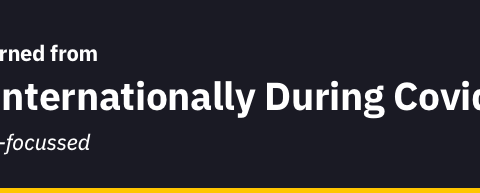
GraphQL: A Look Back at 2018
Developer Careers Stefan Kingham
After really taking off in 2017, growing from a niche technology to something that’s actually being used by thousands of serious companies, GraphQL has gone on to redefine how developers work with APIs and is fast on its way to becoming the new standard for client-server communication.
Supported by the arrival of a host of new tools, libraries and services aimed at improving workflows and enabling widespread adoption, GraphQL and its surrounding ecosystem grew considerably in 2018. So much so that a bunch of new companies started using it in production, explanatory GraphQL guides exploded and the GraphQL community extended its reach to new and exciting horizons.
Here’s a brief rundown of the biggest GraphQL-related news, announcements and wins of the year.
GraphQL Foundation!
We're excited to announce the new GraphQL Foundation being formed by @LinuxFoundation to accelerate development of GraphQL and its surrounding ecosystem. Read more here: https://t.co/vYzMBOYmPh
— GraphQL (@GraphQL) November 6, 2018
One announcement was arguably bigger than all others combined. It was revelead in November that the Linux Foundation was forming a GraphQL Foundation, with the support of a coalition of industry leaders including Airbnb, Apollo, Prisma, Facebook, Github and Twitter, to accelerate GraphQL adoption and grow and sustain a neutral GraphQL ecosystem.
About the establishment of the foundation, Lee Byron wrote that “GraphQL has been a community project longer than it was a Facebook internal project — which calls for its next evolution.” The next few months will be spent “ironing out the details, finalizing a list of founding members, establishing a governance structure, raising funds, and electing committees”.
Looks like GraphQL won’t be going anywhere soon, if you ask us! ;)
GraphQL: An evolving ecosystem

Source: GraphQL Toronto July 2018 - The GraphQL Ecosystem
It’s mind-boggling to think that GraphQL was introduced only 4 years ago, in what was then a non-existent ecosystem void of any supporting tools, libraries or services. Nowadays, GraphQL tools are popping up all over the place and the surrounding ecosystem is dense enough to warrant a stack guide!
urql and several other GraphQL clients were introduced early in the year in an attempt to give Apollo and Relay a run for their money, Graphcool launched Prisma and then rebranded itself to Prisma (releasing several great tools over the course of the year), while Apollo continued to grow and contribute and GraphCMS got a major facelift.
Here’s all that and more in a more digestable format.
Prisma to the rescue
- Prisma, an open-source GraphQL API layer for your database, is released by Graphcool (at the time, soon to be renamed Prisma) in January 2018. Prisma turns your database into a GraphQL API.
- Prisma Cloud is released in March, helping developers to manage deployments and securely access data in the databrowser without worrying about infrastructure management and complicated DevOps workflows.
- Prisma (formerly Graphcool) raises $4.5M in May 2018 to build the GraphQL data layer for all databases and consequently rebrands to Prisma.
- Prisma 1.14 is released, bringing significant improvements for both throughput and speed. Thanks to the new release, Prisma is now able to execute 4 times as many requests as before while maintaining the same execution time.
- Prisma creates and introduces several tools over the year including GraphQL Binding 2.0 and graphqlgen.
- Prisma 1.22 adds support for popular NoSQL database MongoDB.
Apollo on its way to the moon
- On March 22nd 2018, after three months of preparations, a new version of the React Apollo client (2.1) gets released. It features three new components (Query, Mutation and Subscription) and is backwards compatible!
- Apollo Server 2.0 is launched in July and now fits into your existing APIs allowing you to embed REST endpoints right in the server.
- Apollo introduces the Apollo GraphQL Platform in November, a platform focused on helping teams collaborate that adds more functionality to the Apollo ecosystem.
- Apollo announces 3.0 release of the graphql-tools library with improvements for schema stitching functionality, making it easier to compose multiple GraphQL APIs.
The GraphCMS revolution
The GraphCMS team announced they would be going to open source parts of their stack, starting with their web console, in January 2018. 6 months later, they introduced a fresh new set of features and performance increases, did a major redesign of their architecture and started open sourcing their web app.
Large companies betting on GraphQL

Source: Serverless Blog
As exciting as it may be to witness the ecosystem evolving right before our eyes, the icing on the cake comes from the fact that serious companies are adopting GraphQL and praising the impact its had on their capacity to build high-performance web and mobile experiences.
Here are some big companies who placed big bets on GraphQL in 2018:
- After several years of a few eager advocates pushing for GraphQL at Airbnb, the company started launching GraphQL experiments in early 2018 and released a piece in December explaining how Airbnb is moving 10x faster at scale with GraphQL and Apollo.
- The Medium engineering team migrated their stack to use React and GraphQL in early 2018 and wrote about the reasoning behind their decision as well as the overall experience with the migration.
- PayPal introduced GraphQL to their technology stack in 2018 and shared their experience of moving to GraphQL and the impact its had on PayPal Checkout.
- Netflix introduced GraphQL into their Marketing Tech system in 2018 and published their learnings.
- 99designs created gqlgen, a tool for creating strictly typed GraphQL servers in Go, and published a piece detailing their approach and upcoming features.
- The New York Times have invested heavily in both React and GraphQL for several years now. Here’s a piece detailing the scope and extent with which they refactored their website to incorporate React and GraphQL.
- After migrating two years ago from a legacy PHP system to GraphQL and Python, Verve’s Principal Engineer Rob Kirberich recounts their experience with GraphQL and the challenges they’ve faced along the way.
GraphQL Community events

As co-organizers of GraphQL Conf, we know how much the community likes to get together and discuss the latest GraphQL projects. That’s why, in 2018, we organized 2 European events with some of the most exciting speakers around:
- GraphQL Day Amsterdam on April 14th, a GraphQL mini-conference for local communities that combined insightful talks with a practical afternoon workshop. For those who missed it, you can watch all recorded talks from the conference here.
- GraphQL Europe 2018 in Berlin on June 15th, Europe’s biggest GraphQL conference in 2018. Featured brilliants talks from top companies including Facebook, Github, Twitter, Docker, Shopify, Prisma and more. You can watch all talks on the Prisma Youtube channel or watch our selection of the top 5 talks here.
Other big GraphQL events included:
- GraphQL Finland: The nordic GraphQL community met up in Helsinki in October for a day of talks around GraphQL. Read what one of the organizers had to say about it!
- GraphQL Summit: The 2018 edition of GraphQL Summit took place in November in San Francisco and featured some of the biggest names in the GraphQL space such as Peggy Rayzis and Adam Neary. Check out the main highlights from GraphQL Summit 2018 and watch all of the talks on the GraphQL Summit website.
What’s to come for GraphQL in 2019?
If the last 2 years are anything to go by, 2019 is bound to be another year of growth and exciting challenges for the GraphQL community. The creation of the GraphQL Foundation should theoretically accelerate the development of GraphQL and its surrounding ecosystem and a brand new range of clients, libraries and tools will undoubtedly attempt to enter the space.
And as if getting support from a coalition of industry leaders wasn’t enough to get you excited for the future, the community itself is expanding and exploring new territories! That’s right, several brand new GraphQL conferences have been announced for 2019 in the shape of GraphQL Day Toronto and GraphQL Asia (Asia’s first GraphQL Conference!), and GraphQL Europe has evolved into GraphQL Conf!
GraphQL Conf 2019
New Year's resolution? 🎄Learn more about GraphQL! Join us in Berlin on June 20-21st for #GraphQLConf https://t.co/A1dpDhWRXU pic.twitter.com/ShjAlW8yuZ
— Honeypot (@honeypotio) January 1, 2019
Co-organized by Honeypot and Prisma, GraphQL Conf will be back in Berlin on June 20th - 21st, bigger and better than ever before!
Set in a brand new location in the heart of Berlin, GraphQL Conf 2019 will span two whole days and feature some of the biggest names in the GraphQL community, including Dan Schafer, Lee Byron, Mirela Iclodean, Matt Mahoney and many others.
Your ticket covers all talks, plenty of food and drink options as well as an epic after-party to finish things off in style! Better move fast though, Super Early Bird tickets cost €219 until January 18th…
Hope you enjoyed your read, we’ll see you in Berlin on June 20th and 21st! ;)







